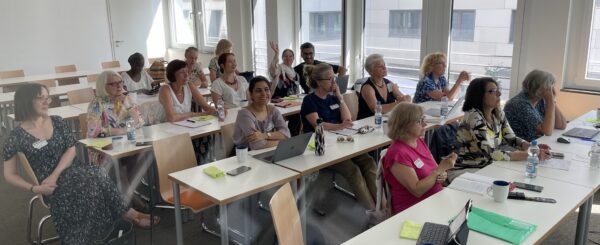Written by: Dr. Haripriya Pareek, ELTAS secretary.
 Sam Gravell deserves a massive round of applause and congratulations for selecting such a relevant and contextual topic related to language teaching and teachers. The workshop “ChatGPT101: Empowering Language Teachers with AI” truly felt empowering and lived up to the expectations of those who attended it.
Sam Gravell deserves a massive round of applause and congratulations for selecting such a relevant and contextual topic related to language teaching and teachers. The workshop “ChatGPT101: Empowering Language Teachers with AI” truly felt empowering and lived up to the expectations of those who attended it.
It’s crucial, especially in the aftermath of COVID-19, that in the new normal scenario of working in a hybrid mode and online, language teachers continually stay ahead of the curve by updating themselves and explore online tools that can enhance their sense of empowerment and make their task of teaching easier. Sam’s workshop served as an eyeopener for everyone, providing them with valuable insights and knowledge on how to navigate this digital landscape effectively.
The workshop emphasized the importance of addressing learners’ needs, which should be at the core of any English language course. With reference to ChatGPT, the workshop showcased the effectiveness of this tool in identifying learners’ specific requirements, thus helping with the process of identifying learners’ needs involved in ESP (English for Specific Purposes). The workshop delved into various aspects including syllabus design, course planning, material creation, and fostering autonomous learning tailored to the individual needs of learners using ChatGPT. Moreover, the discussion revolved around the myriad benefits of utilizing ChatGPT or AI to simplify and streamline the lives of educators by assisting them with syllabus design, course planning, material creation, and promoting autonomous learning. This was a good opportunity for the participants to learn that this cutting-edge tool not only aids in course planning, but also takes a step further by identifying and analyzing domain-specific discourse and tasks and easing the automation of syllabus design with the aid of AI. Another notable advantage of this user-friendly tool is its efficiency in crafting engaging and effective teaching and learning materials. The application, as taught in the workshop, seamlessly carries out various functions, including task creation, designing, and editing autogenerated transcripts of YouTube videos, among other capabilities. What more could one ask for?

Promoting autonomous learning, as presented by Sam, is another important advantage of using ChatGPT and AI. Learners can be effectively taught to carry out activities and take charge of their own language learning. Not only teaching, but assessments can also be made easier using such technology, as it aids in creating assessment and rubrics, along with automating grading and personalized feedback. Furthermore, exploring language questions, reflective practices, and automatic report writing can also be facilitated using this technology.
It is important to understand that everything comes with its limitations and repercussions. Therefore, issues such as plagiarism and ensuring effective use to minimize incorrect answers were also discussed, aiming to help users develop confidence in using the software. It was suggested that user discretion and due diligence in organizing materials and avoiding errors through a double-check may be helpful in this regard. Privacy concerns, copyright infringements, and safety were also part of the discussion. Sam confidently and patiently addressed queries from the participants. However, conducting another workshop that delves into issues such as copyright infringement and safety in detail would also be a good idea, considering the success of this workshop.
Sam’s workshop style was participant-centric and task-based. He engaged participants actively, sparking their interest and transforming it into an interactive experience rather than a one-sided presentation. The sequencing of the workshop content, ensuring a seamless flow, was particularly impressive. Sam skillfully gave ample opportunities for the attendees to exercise their critical thinking, resulting in their active engagement throughout the workshop; it would be appropriate to say that his style had a touch of patience and poise, especially noticeable when he was listening to their answers. He enabled learning and provided ample room for interpretations and contribution through the setup of smart and engaging tasks, which were relatable to the teaching contexts of specific individuals. His feedback was helpful in enhancing the participants’ learning experience. Teachers were encouraged to ask questions and share opinions, and Sam’s attentive listening created a real- time experience. He consistently provided input for better clarity in content and context.
Overall, it was a great learning experience for all involved, both those attending the event in person and online. ELTAS wishes Sam the best for his future endeavors and hopes to learn more about such online tools.


No Comments Yet